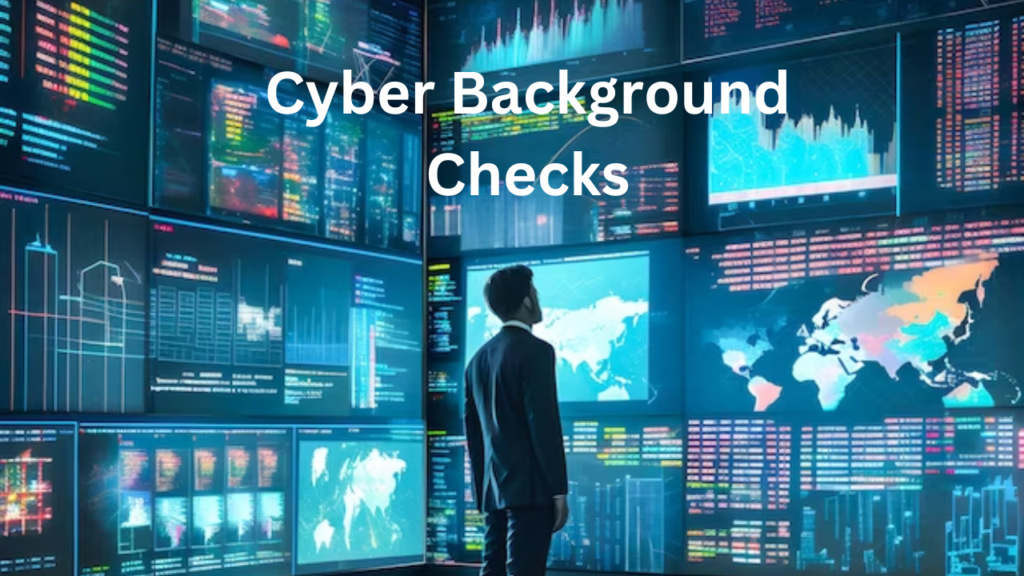The internet has revolutionized how we talk, work and construct relationships. However, this new fashion introduced risks inclusive of net fraud, identity robbery and cybersecurity breache. This is where electronic background checks become important, allowing a person’s digital footprint to be analyzed to assess safety and reliability. As the checks dig into public information available on the web, they offer insights that standard background screening cannot. From hiring processes to personal spheres on safety, cyber background checks are of immense importance and utility in this age of interconnectivity.
Knowing Cyber Background Checks
Cyber background checks involve comprehensive evaluations concerning an individual’s online activities, presence, and history. Online Reputation Checks are not limited by the traditional boundaries of physical records but rather take into account digital behavior in terms of social media activity, online comments, blogs, or any information publicly available.
For example, these screenings may be employed by organizations to determine the honesty of an applicant. On the other hand, individuals may utilize them to determine the validity of a potential spouse or companion. With red flags that include inappropriate online behavior, affiliation with harmful groups, and cyber crimes evidence, one can make an informed decision for either personal or professional use.
How Digital Screening Processes Work
Cyber background checking in general encompasses three basic stages:
- Data Collection: In particular, specialized software and tools scrape public data from sites such as LinkedIn, Twitter, and Instagram. Forums, blogs, and online news archives are also included.
- Analysis: The information that has been collected is analyzed, which may point to patterns, connections, or potential risks. This can be in the form of the tone of the posts, possible aliases, or history of malicious activities.
- Report: Such information is put into a report that summarises the online presence of an individual and at the same time points out areas of concern.
These steps ensure complete results, with actionable insight without violating any law regarding privacy.
Real-World Uses of Digital Background Screening
1. Corporate Hiring Processes
Employers use Online Reputation Checks to vet candidates, particularly for roles that require confidential information or public presentation. For example, if a person has been guilty of online impropriety, that could be an alert regarding the possible company’s reputation threat.
2. Social Media’s Role in Contemporary Interactions
With the development of dating platforms online, the verification of someone’s background is more crucial now than ever before. Cyber background can verify the authenticity of profiles and raise red flags on problematic activities.
3. Tenant Screening for Landlords
Landlords use these screenings to screen potential tenants with regard to criminal history, including cybercrime and posting offensive content.
4. Legal and Financial Verifications
Digital Background Assessments services serve as a tool for legal firms and financial institutions to verify identities while assessing the risk level of certain transactions or cases.
Benefits of Digital Background Screening
Digital Identity Verification are significant because they offer
- Enhanced Security: These checks identify the potential threats before they become threats, for example, like a worker who has a history of cyberbullying.
- Complete Information: Cyber checks, through digital behavior analysis, reveal an individual much deeper than anything else.
- Fraud Detection: Cyber checks can help detect fraudulent claims or activities, such as identity theft.
- Better Decision-Making: With the report given, decision-makers can make their decisions with higher confidence whether it may be an employee’s hiring or a partnership .
Ethical and Legal Concerns
As with all things related to digital Background Assessments, ethical issues have their implications as well:
Risk of Invasion of Privacy
Getting information available to the public does not necessarily mean that the issue of privacy has not crossed the boundary. Excessive or irrelevant details that might embarrass the individual are considered violations to some personal boundaries.
Bias in Interpretation
Interpretations of online posts or comments can become misleading. For instance, through sarcasm or humor, a person can give such an impression to others that do not relate to his or her character.
Compliance with Regulations
Every country has its set of regulations for the use of personal data. In the European Union, for instance, the General Data Protection Regulation requires very strict rules regarding collection and storage of data so that nobody intrudes into privacy.
Organizations and individuals should also observe these laws to avoid litigation.
Problems With Conducting Online Background Checks
Online background checks are very useful, but they are not problem-free:
- Restrictive Information: Some online information might be private and hence not accessible for evaluation.
- Manipulation Online: A person might manipulate online presence to look good while hiding the negative aspects.
- Legal and Ethical Constraints: Legal and ethical constraints can also incur a lawsuit or reputation damage.
- Rapid Changes in Digital Landscapes: Since updating about the latest trend and regulations is tough, evolution in online platforms does not help.
Alternatives to Digital Background Screening
Although Digital Identity Verification are useful, alternative options would complement them in painting a full picture of a candidate:
- In-Person References: Talking to former colleagues, friends, or acquaintances might tell more than online information could.
- Traditional Background Checks: It unites cyber checks with actual record verification, such as criminal or educational history, in order to release a more balanced report.
- Psychometric Testing: Psychometric tests, in corporate purposes, will reveal traits in your behavioral characteristic that online checks may miss.
The Future of Digital Screening and Verification
With advancing technology, so will the reach and accuracy of cyber background Artificial intelligence and machine learning technologies may be introduced to speed up data processing and now permit insights deeper than ever. Predictive analytics may even be in this package to enable businesses as well as individuals to predict possible risks through pattern in online behavior.
There will be an additional area on privacy, with the growing concerns of digital privacy, a clearer framework and tools for compliance with privacy laws, in order to enhance prevention and possibly expand use.
‘Role of Technology in Enhancing Online Screening
Technological improvements transform the face of online screening procedures. Tools powered by artificial intelligence and ML can track a massive amount of digital data within seconds and seek patterns that will never be identified by a human being. For instance, AI can examine the tone and sentiment behind social media posts, exposing insights into a person’s behavior or values.
Simultaneously, the possibility is researched regarding blockchain and data authenticity that is used for an online screening process. Blockchain provides tamper-proof digital records; therefore, the information garnered from the screening process is more reliable. Moreover, continuation of NLP development further aids in more contextual interpretation of online communication, thus eradicating the element of a tendency to misjudge someone due to vague language.
These developments do not only accelerate and improve accuracy but also make it easy to comply with data protection laws by responsible usage of data. With time, screening methods online will become even more precise and efficient with advanced technology.
Combination of Privacy and Security while Implementing the Digital Screening Process
With the rise of digital screening, finding a balance between privacy and security has become increasingly crucial. Even though an element of personal and professional risk assessment has to take place, there also is an obligation to privacy. Organisations should have practices that respect such boundaries by accessing only information that is relevant and publicly available.
In this sense, anonymity can secure sensitive personal details while at the same time ensuring proper risk assessment. Secondly, adopt anonymized data analysis techniques to help in maintaining transparency – let individuals know how and why they are being screened, thereby instilling trust and honest practice.
With privacy and security on either side, digital screening can still remain a strong yet ethical tool for creating safer environments in both personal and professional spheres.
The Impact of Digital Screening on Personal Branding
Personal branding extends far beyond resumes and in-person contacts today due to an increasingly interconnected world. This digital screening often serves as the first impression, since employers and organizations review an individual’s online activity to gauge the same professionalism and values. A well-maintained digital presence can therefore add value to personal branding by portraying expertise, ethical behavior, and organizational alignment.
On the other hand, malicious online behaviors like posts or associations deemed inappropriate and contentious years ago can harm one’s reputation. So, managing an online identity proactively is essential. Professional curations of profiles, aversion of contentious content, and positive engagement on social platforms will ensure that the online footprints support one’s personal brands-a complement to one’s offline credentials.
Conclusion
With digital footprints in nearly every online interaction, today cyber background checks are an integral part to any form of trustworthiness and risk mitigation process. It spans personal safety to securing business interests and thus finds diverse applications invaluable. But these have to be run in ethical manners-respecting privacy and the regulations in place for that process.
Progress in technology is going to increase cyber background checking. It would prove to be a potent tool in trying to understand the complexities of cyberspace.


